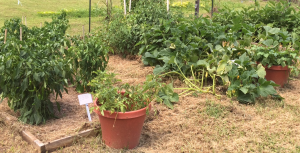Being a gardener in the panhandle has its advantages. We’re able to grow a tremendous variety of vegetables on a year-round basis. However, in this climate, plant diseases, insects and weeds can often thrive. Usually, chemical measures are applied to thwart these pests. Some panhandle gardeners are now searching for techniques regarding a more natural form of gardening, known as organic. With fall garden planting just ahead, this may be an option for conventional vegetable gardeners looking for a challenge.
So, what is organic gardening? Well, that really depends on who you ask. A broad definition is gardening without the use of synthesized fertilizers and industrial pesticides. Fair warning, “organic” does not translate into easier physical gardening methods. Laborious weeding and amending of soil are big parts of this gardening philosophy. This begs the question, why give up these proven industrial nutrient and pest control practices? Answer: organic gardening enthusiasts are extremely health conscious with the belief that vigorous outdoor activity coupled with food free of industrial chemicals will lead to better nutrition and health.
As stated earlier, the main difference between conventional and organic gardening is the methods used in fertilization and pest control. In either gardening style, be sure to select a garden plot with well-drained soil, as this is key for any vegetable crop. Soil preparation is the most important step in the process. To have a successful organic operation, the garden will require abundant quantities of organic material, usually in the form of animal manures and compost or mixed organic fertilizer. These materials will ensure water and nutrient holding capacity. Organic matter also supports microbiological activity in the soil. This contributes additional nutrients for plant uptake. Organic fertilizers and conditioners work very slowly. The vegetable garden soil will need to be mixed and prepped at least three weeks ahead of planting.
Effective organic pest management begins with observing the correct planting times, selection of the proper plant variety and water scheduling. Selecting vegetable varieties with pest resistant characteristics should be considered. Crop rotation is also a must. Members of the same crop family should not be planted repeatedly in the same organic garden soil. Over watering can be an issue. Avoid soils from becoming too wet and water only during daylight hours.
For weed management, using hand tools to physically removing weeds is the only control method. As for insect management, planting native plants in the immediate landscape of the organic garden will help draw in beneficial insects that will feast on garden insect pests. The use of horticultural oil or neem oil is useful. However, please read the product label. Some brands of oils are not necessarily “organic”. Nematodes, which are microscopic worms that attack plant roots, are less likely an issue in organic gardens. High levels of organic matter in soil causes an inhospitable environment for nematodes. Organic disease management unfortunately offers little to no controls. Sanitation, planting resistant varieties and crop rotation are the only defense mechanisms. Sanitation refers to avoiding the introduction of potential diseased transplants. Disinfecting gardens tools will also help. Hydrogen peroxide, chlorine and household bleach are disinfecting chemicals allowed in organic gardening settings as these chemicals are used in organic production systems for sanitation. Staking and mulching are also ways to keep plants from diseases by avoiding contact with each other and the soil.
Organic gardening can be a challenge to manage, but better health and nutrition could be the reward. Please take the article recommendations into consideration when deciding on whether to plant an organic garden. For more information, contact your local county extension office.
Supporting information for this article can be found in the UF/IFAS EDIS publication, Organic Vegetable Gardening in Florida, by Danielle D. Treadwell, Sydney Park Brown, James Stephens, and Susan Webb.
- Why Are Sand Dunes & Sea Oats So Important? - March 20, 2025
- How to Care for a Gift Plant - December 5, 2024
- Fall Leaf Colors Are Just Around the Corner - September 4, 2024

